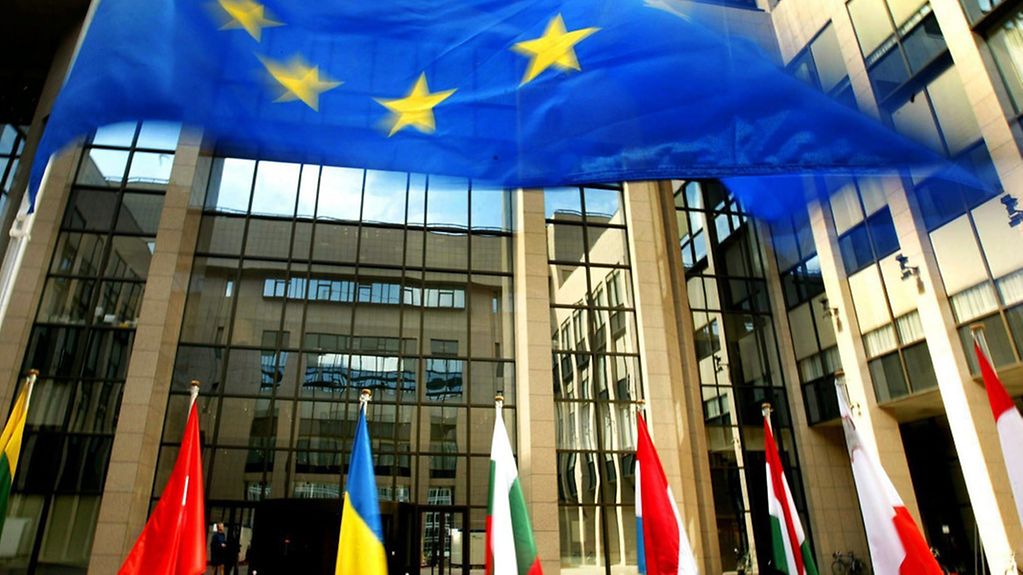Intensive crisis diplomacy
The situation in Ukraine continues to give grounds for concern. Chancellor Angela Merkel will thus be attending an extraordinary meeting of the EU heads of state or government in Brussels on 6 March, where she will also meet Ukrainian Prime Minister Arseniy Yatsenyuk.
4 min reading time

In Brussels the EU heads of state and government will discuss the situation in Ukraine
Photo: picture-alliance / dpa
In the run-up to the meeting the German government consulted closely with European partners and with the US administration. On Tuesday evening the Chancellor spoke by phone with US President Barack Obama.
During their conversation there was a high level of agreement between Angela Merkel and Barack Obama in the way they see the most recent developments and in the conclusions they draw. They agreed to stay in contact and will continue to consult and coordinate their policies closely.
Fact-finding missions
The German government welcomes the fact that the first steps in a fact-finding mission have been taken with UN special envoy Robert Serry, who is currently in Ukraine on the Crimean peninsula. The Bundeswehr is also deploying two unarmed military observers within the scope of an OSCE observer mission.
Ukraine will voluntarily host a visit to dispel concerns about military activities from 5 to 12 March 2014 in line with Article 18 des 2011 Vienna Document on confidence building measures and risk reduction.
Bundeswehr provides support on the ground
The German Embassy in Kyiv has received a request from the Ukrainian government for support in caring for 50 injured Ukrainians. The injuries were sustained as a result of unrest on the Maidan (Independence Square) in Kyiv.
To this end a Bundeswehr medical team will initially assess the condition of the injured in Kyiv before preparing them for transport to Germany.
Extraordinary meeting of EU heads of state and government on 6 March
Herman Van Rompuy, President of the European Council, has called tomorrow’s meeting in response to the current situation in Ukraine. It is not a European Council meeting but a meeting of the EU heads of state and government.
The President of the European Commission José Manuel Barroso, and the High Representative of the Union for Foreign Affairs and Security Policy, Lady Catherine Ashton, will also attend the meeting. Initially the heads of state and government will meet Ukrainian Prime Minister Arseniy Yatsenyuk.
Meeting of foreign ministers in Paris
On Wednesday Russia’s Foreign Minister Sergey Lavrov and the US Secretary of State John Kerry met in Paris for the first time since the Crimean crisis escalated. Several European foreign ministers including Frank-Walter Steinmeier, Federal Foreign Minister, are also expected at the Elysée Palace for a conference on the situation in the Lebanon, which has been planned for some time. The foreign ministers are expected to discuss the crisis in Ukraine as well.
Political and diplomatic process
Speaking in Berlin, government spokesperson Steffen Seibert said that only a political and diplomatic process of discussion and understanding could lead the way out of the crisis. He stressed the need for self-restraint on all sides. "If there is to be a diplomatic process, then everything must be done to stabilise Ukraine and everything that could destabilise the situation must be rejected," he underscored. Russia too must refrain from any action that would be likely to aggravate the situation.
The government spokesperson also pointed out that Ukraine’s political leaders must preserve the internal cohesion of their country. "Every ethnic group must be free to express their ethnic and cultural diversity, and must enjoy the protection of the state."
In the view of the German government it is important for the international community to keep talking to the Russian government, and especially to President Vladimir Putin. To step up dialogue among all stakeholders a contact group should be established.
Breach of international law
In a statement, the G7 states (Germany, the USA, Canada, France, the United Kingdom, Italy and Japan), as well as the President of the European Commission and the President of the European Council have condemned the Russian contravention of the UN Charter and international agreements. In their statement, the G7 leaders stress their support for Ukrainian sovereignty and territorial integrity.
Government spokesperson Steffen Seibert once again underlined the importance of Ukrainian sovereignty. "As a result of Russia’s action, the current state in Crimea is in contravention of international agreements, which Russia has pledged to uphold. This is an unacceptable state of affairs."
In 1994 Russia undertook to respect the independence and sovereignty of Ukraine and its current borders in the Budapest Memorandum. In 1997 the Black Sea Fleet Accord regulated the terms under which the Russian Black Sea Fleet would continue to be stationed in Crimea.